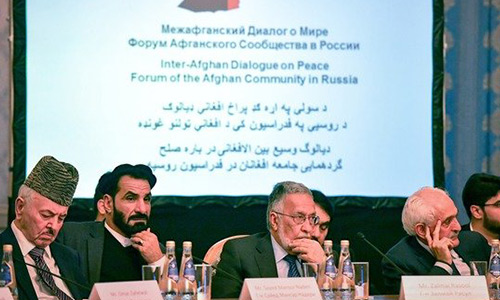The Talks between United States and Taliban is supposed to resume in next few days after it was suspended for the second time following a suicide attack on a US base outside Kabul that killed two civilians. During the break, there were a lot of optimisms and hopeful reports that Taliban are willing to agree on temporary ceasefire but finally the group rejected the reports. They justified as if they have reached a partial agreement about the reduction of violence in Afghanistan. Earlier, they had released two Afghan-US university professors in exchange of the three Taliban figures hoping to farther accelerate the peace process. Unfortunately, not only Taliban come down from dogmatic positions but also intensified their attacks whenever the peace talks are closed to resume.
In the meanwhile, whenever the peace talks are going to resume, the gaps between Afghan political factions are increased in the country. Two days ago, the High Peace Council spoke out against the government views and implicitly criticized the government’s positions about peace process. Accordingly, Last week, Karim Khalili, the head of High Peace Council, criticized the Afghan government saying the Taliban was ready to negotiate about peace but not with the current government and specifically with the current president. He, somehow, blamed the government and the president for hindering progress of peace process. This shows the increasing gaps between government and Afghan politicians.
Now, we are at a stage that the fractions’ positions are clearer than ever and the gaps have become more deepened while before there was a relatively half-hearted consensus on the main national issues and macro national interests in the country. Unfortunately, as long as the personal and factional interests of some politicians demands, they will be in the favor of republicanism, constitution, civil values and human rights which are the gains of the Afghan government in last eighteen years. But when their factional interests and political demand are changed, their political stance will also change. For this reason, many politicians have openly spoken about the alternative options in recent months; instead of the current government, they talk about an interim-government and show very little sympathy to the current political system. However, there were some individuals who firmly stood against such views in the country.
It seems that these political divisions have originated from two different and unwritten views on the subject of peace process. The first view is based on the idea that main problem of Afghanistan is peace and key of peace is at the hand of Taliban. According to this view, if we cannot cross from the main achievements of past eighteen years, at least we should be flexible against Taliban and give them some small privileges. This way, we would be able to win the hearts of Taliban and create a process that will lead to peace. For this reason, no matter if we abandon the current government which is the symbol of Afghan political system. However, there are different figures among these categories of politicians and some of them are just following their own interests. Anyhow, they are a group of politicians who emanated from the context of the country truly or untruly seek peace process.
The second view is centered with the leadership of the Afghan government and they want peace, but not at any cost. According to this view, peace is important, but there are some fundamental values such as human rights, women’s rights, girls’ education, civil values, freedom of expression, constitution, the republican system and election mechanism which cannot be sacrificed under the pretext of peace talks. As the Afghan government, especially Mr. Ghani is at the center of this view, many are skeptical about it. They claim that the Afghan government leadership is raising such issues is for its own sake otherwise it doesn’t believe in these things. Regardless of truthfulness or untruthfulness of this view, it does not matter what the Afghan government or officials have in mind. Rather, it is important that a wide range of Afghan officials and Afghan people oppose to returning to the past and repeat of the Taliban era with collapse the Afghan political system and civil values.
Moreover, the Taliban have never shown a practical will in a lasting peace in the shadow of civil values and human rights. It is clear that the Taliban will never consent to join a political system based on elections and people’s votes. The Taliban will only come to Afghanistan with the sole purpose of realizing the Islamic Emirate and adhering to their religious values.
In practice, Taliban have clearly shown that they are not willing to retreat from its main dogmatic claims and views. They have repeatedly divulged their intentions in the battle fields and also in table of negotiations. So, the Taliban will only accept the peace if everything is submitted to them and others can have a factitious presence only if they agree with the Taliban values. Therefore, at one side there are Taliban values and its backers and on the other side Afghan government and its supporters who claim to advocate a peace in which all the eighteen years achievements should be protected. Now, the most important question for the Afghan people is which peace do they want? A peace in which everything is lost and we go back to the past, or a peace in the shadow of our past achievements.
Home » Opinion » Why No National Consensus on the Afghan peace process?
Why No National Consensus on the Afghan peace process?
| Mohammad Zahir Akbari

